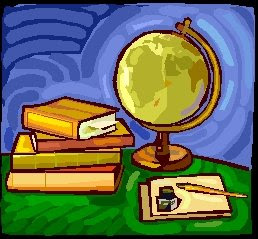If you're struggling with your reading assignments -- not doing well on reading quizzes, for instance -- then you need to stop and think about a new strategy...TIP #1Know your best reading pace and environment. Go ahead and give yourself a little reading test: set yourself up with a book and set the timer at 30 minutes. See how many pages you can comfortably read. Try this out with 2 or three different types of reading to see what the difference is. For instance, you might find that you can breeze through 20 pages of a good novel in half an hour, but only 10 pages of your science textbook. Also, be honest with yourself about the reading environment you need: dim or bright lights; silence, white noise, or music; cold or warm temperature; laying down or sitting up; long hauls or short sessions with exercise/snack breaks; reading aloud or silently. Know yourself and plan well for upcoming due dates.
THE "SLOW READING" TECHNIQUE: We've been modeling this in class and quiz scores are going up! Simply read one sentence at a time and then paraphrase it, incorporating any available footnotes into the paraphrase and avoiding any pronouns (say the characters' names). For aural learners, this should be done aloud. If this pace is a little too slow for you, try one paragraph at a time.
TIP #2Know something about genre and audience. As already mentioned above, your reading speed may vary for different types of text. Indeed, different types of text will demand different skills in comprehension, interpretation, and recall. Get in the habit of recognizing the genre of your reading material before you begin reading it: factual versus imaginative, narrative versus nonfiction, written text versus performed text, poetry versus prose, etc. You should also know a bit about the intended audience of the text. Was it written for your age group? Was it written for a foreign culture? Was it written for a past time period? All these issues will impact the difficulty of what you're about to read and how you should "angle" yourself to receive its message clearly.
TIP#3If you're reading narrative, your job is to get to know the characters and find out what they did and why. A great way of making sure you're following the most important points of the story is to write down a "Who-What-When-Where-Why/How" summary after each reading session you perform, perhaps after every chapter. At the very least, keep a "Who" list of character names and ID's. The"What" segment will be plot summary. The "Why/How" part gets you thinking in a higher Bloom level, which is the ultimate goal for readers. You might do a "WWWWWH" list at the end of each reading session. If you're a visual learner, keep it especially neat and organized.
TIP #4If you're reading prose nonfiction, your job is to get new information "filed away" into your brain so that you can access the "files" later. 1)Look for new terms. Consider underlining or highlighting them.
2) Look for "chunks" of information. Group your notes into categories on the page so it feels like you're learning 3 sets of 5 facts rather than 15 unrelated, rambling facts.
3) Look for ways the book emphasizes information - repetition, bold text, etc. Underline or "star" these ideas in your notes. The beginning and ending ideas of the chapter or essay might also be clues to emphasis.
TIP #5If you're reading something poetic, you must prepare your brain cells for imaginative and artistic thinking. How do you know it's poetic? It might look like poetry, with short lines and patterns. It might sound like poetry, with repetition and alliteration. It might feel like poetry, with a focus on the senses, particularly images. And it might "think" like poetry, if the statements can't be properly understood in a literal way. Once you've recognized your text as poetic, you must open the door to figurative interpretations. You should also consider reading the text aloud, letting your voice shape the words in a musical, emotional way. Where poetry is concerned, art and imagination are central to "getting it."
TIP #6If you are not the originally intended audience, you must give the text some extra time and some extra context. In reading Shakespeare, recognize that you are living 400 years down the road, and you will need footnotes along the way. In reading the New Testament, find out something about the churches to whom the apostles were writing. In reading foreign literature, learn something about what the target culture expected in a work of literature. It will take some effort to get yourself into a place where you're ready to receive the "gift" originally wrapped up for a different "recipient."
TIP #7Beginnings and endings are big keys to meaning. Regardless of what type of text you are reading, review the introduction and conclusion before you close the book. In the first and last words of a complete work of literature, you might find main ideas, point of view, important images or motifs, central themes, or implied instructions to the reader. ALSO: When you need to skim your reading, the best speed strategy is to read the first and last sentences of each paragraph.
TIP #8If you feel like you are struggling as a reader... you might want to supplement the above methods with some
learning-style strategies. For instance, a
visual learner could make a chart or re-copy notes with colors and illustrations. An
aural learner might need to read text and notes aloud, do slow reading out loud, or summarize what you read to a partner; you could also read along with a recording of the book, if available.
Kinetic learners might respond well to rhythmic repetition or an active study technique like using flashcards; you should also get a little exercise before reading (to avoid feeling fidgety) and break your reading sessions into 20-30-minute chunks with movement or snack breaks. Every brain has the capacity to read!
